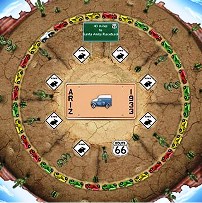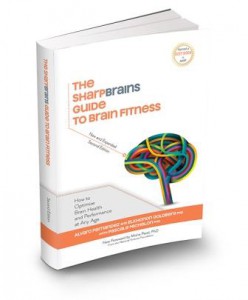Train your brain with targeted videogames, not with crossword puzzles
 Study shows mental agility game slows cognitive decline in older people (Iowa Now): “Wolinsky and colleagues separated 681 generally healthy medical patients in Iowa into four groups—each further separated into those 50 to 64 years of age and those over age 65. One group was given computerized crossword puzzles, while three other groups were exposed to a video game called “Road Tour,” (since renamed “Double Decision”), marketed by Posit Science Corp…The groups that played the game at least 10 hours, either at home or in a lab at the university, gained, and retained, at least three years of cognitive improvement when tested after one year, according to a formula developed by the researchers. A group that got four additional hours of training with the game did even better, improving their cognitive abilities by four years, according to the study.”
Study shows mental agility game slows cognitive decline in older people (Iowa Now): “Wolinsky and colleagues separated 681 generally healthy medical patients in Iowa into four groups—each further separated into those 50 to 64 years of age and those over age 65. One group was given computerized crossword puzzles, while three other groups were exposed to a video game called “Road Tour,” (since renamed “Double Decision”), marketed by Posit Science Corp…The groups that played the game at least 10 hours, either at home or in a lab at the university, gained, and retained, at least three years of cognitive improvement when tested after one year, according to a formula developed by the researchers. A group that got four additional hours of training with the game did even better, improving their cognitive abilities by four years, according to the study.”
Study: A Randomized Controlled Trial of Cognitive Training Using a Visual Speed of Processing Intervention in Middle Aged and Older Adults (PLOS ONE)
- Background: Age-related cognitive decline is common and may lead to substantial difficulties and disabilities in everyday life. We hypothesized that 10 hours of visual speed of processing training would prevent age-related declines and potentially improve cognitive processing speed.
- Methods: Within two age bands (50–64 and?65) 681 patients were randomized to (a) three computerized visual speed of processing training arms (10 hours on-site, 14 hours on-site, or 10 hours at-home) or (b) an on-site attention control group using computerized crossword puzzles for 10 hours. The primary outcome was the Useful Field of View (UFOV) test, and the secondary outcomes were the Trail Making (Trails) A and B Tests, Symbol Digit Modalities Test (SDMT), Stroop Color and Word Tests, Controlled Oral Word Association Test (COWAT), and the Digit Vigilance Test (DVT), which were assessed at baseline and at one year. 620 participants (91%) completed the study and were included in the analyses. Linear mixed models were used with Blom rank transformations within age bands.
- Conclusion: Visual speed of processing training delivered on-site or at-home to middle-aged or older adults using standard home computers resulted in
 stabilization or improvement in several cognitive function tests. Widespread implementation of this intervention is feasible.
stabilization or improvement in several cognitive function tests. Widespread implementation of this intervention is feasible.
–> To learn more about cognitive training and personalized brain training, check out our new book The SharpBrains Guide to Brain Fitness: How to Optimize Brain Health and Performance at Any Age


